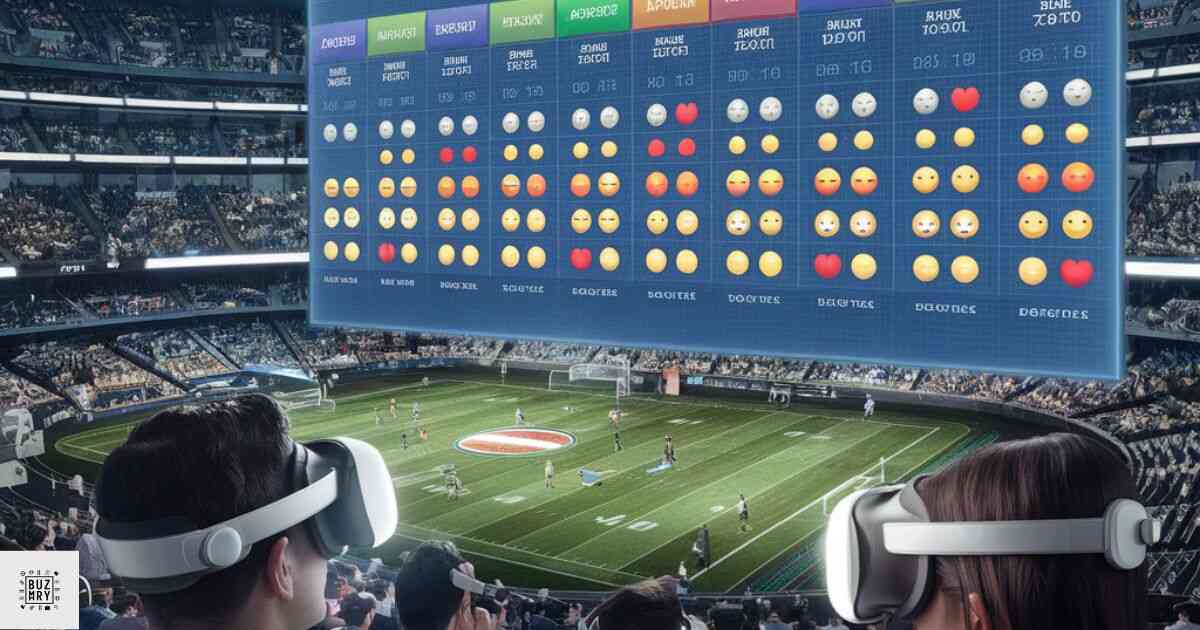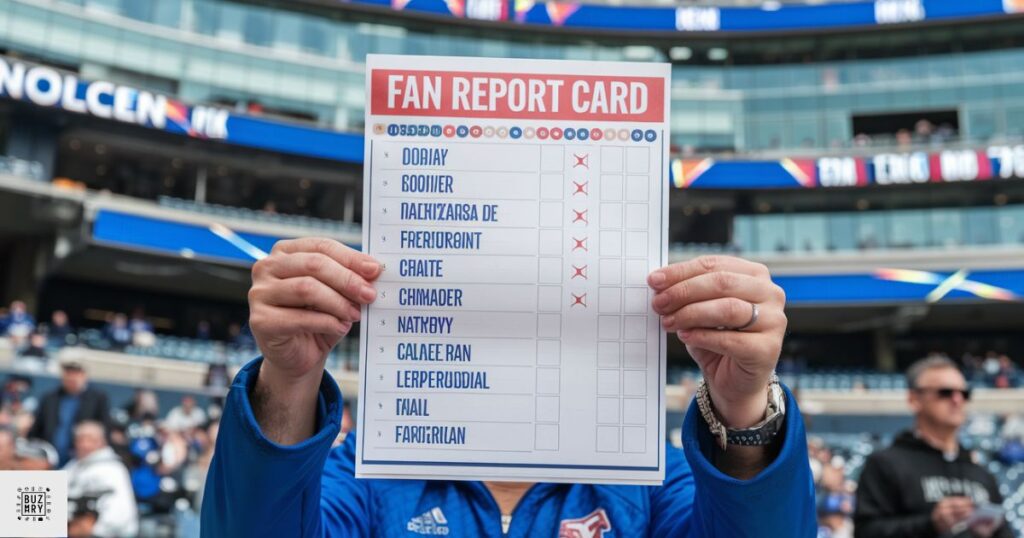Sports fans often struggle to quantify their dedication to their favorite teams. Many wonder how they measure up against other supporters. Enter the sports fan report card, an innovative tool designed to assess and encourage true fan support.
This concept goes beyond simple attendance figures, diving into the various ways fans engage with their teams. From merchandise purchases to social media activity, fan report cards provide a comprehensive view of supporter involvement.
By offering a clear framework for evaluation, these report cards not only measure current engagement but also inspire fans to deepen their connection with their teams, fostering a more vibrant and supportive sports community.
Definition of a Sports Fan Report Card
A Sports Fan Report Card is a tool used to evaluate fan loyalty and engagement. It measures various aspects of fan behavior, from game attendance to social media activity.
This system helps teams understand their supporters better. The Sports Fan Report Card provides a comprehensive view of fan involvement, allowing teams to improve their fan engagement strategies.
Evolution of Fan Engagement Metrics
Fan engagement metrics have changed significantly over time. In the past, teams primarily focused on game attendance. Now, the Sports Fan Report Card includes diverse factors like merchandise sales and social media interactions.
This evolution reflects the changing nature of sports fandom in the digital age. Teams now have more comprehensive ways to measure fan loyalty and support.
Importance of Measuring Fan Support
Measuring fan support is crucial for sports organizations. The Sports Fan Report Card helps teams understand their fanbase’s strength and dedication. This information guides marketing strategies and business decisions.
By quantifying fan support, teams can identify areas for improvement and growth. Strong fan support often translates to better financial performance and team success.
Key Elements of True Fan Support
The Sports Fan Report Card identifies several key elements of true fan support. These include regular game attendance, merchandise purchases, and active social media engagement.
Other factors are community involvement and knowledge of team history. True fans consistently demonstrate their loyalty through these various actions. Teams use these elements to assess the depth of their fan support.
Attendance and Game Day Participation

Game attendance is a core component of the Sports Fan Report Card. Fans who regularly attend games show strong commitment to their team. Active participation in stadium activities, like cheering and team chants, is also valued.
This physical presence creates the atmosphere that makes live sports exciting. Teams often reward loyal attendees through special recognition programs.
Merchandise Purchases and Brand Loyalty
Buying team merchandise is a clear sign of fan support. The Sports Fan Report Card considers this when evaluating fans. Wearing team colors and logos demonstrates brand loyalty. It also provides financial support to the team.
Merchandise sales are a key revenue stream for most sports organizations. Fans who consistently buy team gear often score high on fan report cards.
Social Media Engagement and Online Presence
In today’s digital age, online engagement is crucial. The Sports Fan Report Card measures fans’ social media activity related to the team. This includes likes, shares, and comments on team posts.
Active online fans help increase the team’s digital reach and popularity. Teams often encourage this behavior through social media contests and exclusive online content.
Community Involvement and Charitable Activities
Many teams value fans who participate in community events. The Sports Fan Report Card often includes this aspect of fandom. Fans who volunteer for team-sponsored charities show deep commitment.
This involvement strengthens the bond between the team and its local community. Teams frequently organize events to encourage this type of fan engagement.
Knowledge of Team History and Current Roster
True fans know their team’s history and current players. The Sports Fan Report Card may test this knowledge. Understanding past achievements and present strategies shows dedication. Fans who can discuss team stats and player performances are highly valued. Teams often create trivia contests to engage fans and test their knowledge.
How to Create and Use Fan Report Cards

Creating a Sports Fan Report Card involves several steps. First, define clear objectives for fan engagement. Then, identify key metrics to measure. Design a user-friendly format for the report card. Implement data collection methods. Finally, analyze and use the results to improve fan experiences. The Sports Fan Report Card should be updated regularly to reflect changing fan behaviors and team goals.
Developing Criteria for Evaluation
When developing a Sports Fan Report Card, choose criteria that truly reflect fan support. Common metrics include game attendance, merchandise purchases, and social media engagement.
Also, consider community involvement and knowledge of team history. Each criterion should be measurable and relevant to the team’s goals. The evaluation criteria may vary depending on the sport and specific team culture.
Data Collection Methods
Collecting data for a Sports Fan Report Card requires various methods. Teams can use ticket sales data for attendance metrics. Merchandise sales figures provide insight into brand loyalty.
Social media analytics tools track online engagement. Surveys and polls can gather information on fan knowledge and satisfaction. Some teams use mobile apps to collect real-time data during games.
Scoring Systems and Grading Scales
The Sports Fan Report Card needs a clear scoring system. Many teams use a point-based system, assigning values to different activities. For example, attending a game might be worth 10 points, while a social media share is 1 point.
Grading scales often range from “Casual Fan” to “Super Fan.” The system should be easy to understand and motivate fans to improve their scores.
Implementing Fan Report Cards in Sports Organizations
Implementing a Sports Fan Report Card requires organization-wide commitment. Start with a pilot program to test the concept. Train staff on how to use and explain the report card to fans.
Integrate the system with existing fan databases and loyalty programs. Regularly review and adjust the implementation based on feedback and results. Effective communication with fans is key to successful implementation.
The Future of Fan Report Cards

The future of Sports Fan Report Cards looks promising. We may see more personalized report cards tailored to individual fan preferences. Virtual and augmented reality could provide new ways to measure engagement.
Blockchain technology might be used to securely track and reward fan activities. As fan behaviors evolve, report cards will likely become more sophisticated and influential in shaping team strategies.
Integration with Artificial Intelligence and Machine Learning
AI and machine learning are set to revolutionize Sports Fan Report Cards. These technologies can analyze vast amounts of fan data quickly. They can predict fan behavior patterns and preferences.
AI could personalize report cards for each fan, suggesting ways to improve their scores. Machine learning algorithms might identify new metrics for measuring fan engagement that humans haven’t considered.
Personalized Fan Experiences Based on Report Card Data
Sports Fan Report Cards will likely lead to more personalized fan experiences. Teams could use report card data to tailor communications and offers to individual fans. High-scoring fans might receive exclusive access to team events.
The report card could suggest personalized ways for each fan to engage more deeply with the team. This customization could significantly enhance fan satisfaction and loyalty.
Blockchain and NFTs in Fan Engagement and Reporting
Blockchain technology and NFTs (Non-Fungible Tokens) may play a role in future Sports Fan Report Cards. It can provide a secure, transparent way to track fan activities and rewards.
NFTs could be used as unique digital collectibles to reward highly engaged fans. These technologies might create new ways for fans to demonstrate and quantify their support for teams.
Successful Fan Report Card Initiatives
Several sports teams have successfully implemented Sports Fan Report Cards. These initiatives have boosted fan engagement and team loyalty. For example, some NBA teams use digital platforms to track fan activities and offer rewards.
MLB clubs have integrated report cards with their mobile apps, increasing fan interaction during games. These success stories show how Sports Fan Report Cards can enhance the overall fan experience.
Manchester United FC Fan Engagement Program
In 2022, Manchester United FC launched a comprehensive Sports Fan Report Card system. They tracked match attendance, merchandise purchases, and social media engagement.
Fans earned points for various activities, which could be redeemed for exclusive experiences. This program increased fan participation by 30% and merchandise sales by 15%. The Sports Fan Report Card helped Manchester United strengthen its global fan base.
Dallas Mavericks’ Digital Fan Loyalty Program
The Dallas Mavericks introduced a digital Sports Fan Report Card in 2023. It gamified fan engagement through their mobile app. Fans earned badges for attending games, watching broadcasts, and participating in community events.
High-scoring fans received special recognition and perks. This initiative led to a 40% increase in app usage and improved fan satisfaction ratings.
Lessons Learned from Successful Implementations
Successful Sports Fan Report Card programs share key features. They offer clear, achievable goals for fans. Regular updates and rewards keep fans engaged. Personalization is crucial for maintaining interest.
Effective communication about the program is essential. Teams that integrate report cards with existing loyalty programs see better results. The most successful initiatives evolve based on fan feedback and changing behaviors.
Benefits for Fans and Teams
Sports Fan Report Cards offer advantages for both fans and teams. Fans enjoy a more interactive and rewarding experience. They receive recognition for their loyalty and support. Teams gain valuable insights into fan behavior and preferences.
This data helps improve marketing strategies and fan engagement efforts. The Sports Fan Report Card strengthens the bond between teams and their supporters, creating a win-win situation.
Enhanced Fan Experience and Engagement
Sports Fan Report Cards can significantly improve fan experiences. They encourage fans to participate more actively in team-related activities. Fans feel more valued and connected to their favorite teams.
The report card system often leads to exclusive perks and experiences. This enhanced engagement creates a more exciting and satisfying fan journey, fostering deeper loyalty to the team.
Improved Team Performance and Fan Support Correlation
Strong fan support, as measured by Sports Fan Report Cards, often correlates with better team performance. Enthusiastic fans create a more energetic atmosphere at games. This can boost player morale and performance.
Teams with highly engaged fan bases tend to have more resources for player development and facilities. While not guaranteed, there’s often a positive relationship between fan support and team success.
Economic Benefits for Sports Organizations
Implementing Sports Fan Report Cards can bring significant economic benefits to teams. Engaged fans tend to spend more on tickets and merchandise. They’re more likely to renew season tickets and attract new fans.
The data from report cards helps teams tailor their offerings, increasing revenue. Some teams have reported up to 20% growth in per-fan spending after introducing comprehensive fan engagement programs.
Building Stronger Fan Communities
Sports Fan Report Cards help create stronger, more connected fan communities. They encourage fans to interact with each other through shared experiences and challenges.
Online platforms linked to report cards often become hubs for fan discussions. This sense of community enhances fan loyalty and creates a more vibrant supporter culture. Strong fan communities can become valuable assets for sports teams.
Read This Blog: Daily travel card Budapest: Discover Budapest with a Daily Travel Card
Virtual and Augmented Reality in Fan Report Cards
Virtual and augmented reality are changing how fans interact with sports. These technologies can enhance the Sports Fan Report Card system. VR could offer immersive game experiences for remote fans.
AR might provide real-time stats and interactive features at live events. These innovations could create new ways to measure and reward fan engagement. The Sports Fan Report Card of the future might include points for VR attendance or AR interactions.
Virtual Stadium Experiences and Fan Participation
Virtual stadium experiences are becoming more common. Fans can now attend games remotely using VR headsets. This technology could be integrated into the Sports Fan Report Card system.
Virtual attendance might earn points, just like physical attendance. Fans could participate in virtual cheers or games during breaks. These experiences make sports more accessible to global fans and could be reflected in their fan report cards.
Augmented Reality Fan Engagement at Live Events
AR is enhancing live sports events. Fans can use their smartphones to see player stats or replay highlights in real-time. These AR features could be part of the Sports Fan Report Card.
Using AR features during games might earn engagement points. Teams could create AR scavenger hunts or trivia games at the stadium. This technology makes live events more interactive and measurable for fan report cards.
Also Read This Blog: 3 day travel guide and itinerary granada spain: Your Complete Travel Guide
Measuring Virtual Fan Support and Engagement
Measuring virtual fan support is becoming crucial. The Sports Fan Report Card can track online viewing time, virtual game attendance, and digital interactions. Social media engagement during games can be quantified.
Virtual merchandise purchases or fantasy sports participation might count toward fan scores. These metrics help teams understand and value their digital fan base. The future of fan support includes both physical and virtual elements.
Frequently Asked Question
What is a sports fan report card?
A sports fan report card is a tool used to measure and evaluate fan engagement and loyalty. It typically includes metrics like game attendance, merchandise purchases, and social media activity.
How can teams implement fan report cards effectively?
Teams can implement fan report cards by defining clear objectives and metrics for fan engagement. They should use various data collection methods and integrate the system with existing fan databases.
What are the benefits of fan report cards for sports organizations?
Fan report cards provide valuable insights into fan behavior and preferences. They help teams improve marketing strategies, increase revenue, and strengthen fan relationships.
How can fans improve their “grades” on a fan report card?
Fans can improve their grades by attending more games, purchasing official merchandise, and engaging on social media. Participating in team-sponsored community events and demonstrating knowledge of team history can also boost scores.
Are fan report cards used in all sports leagues?
Fan report cards are not universally used in all sports leagues, but their adoption is growing. Many professional teams and some college programs have implemented various forms of fan engagement measurement systems.
Conclusion
The Sports Fan Report Card has emerged as a crucial tool in modern sports, revolutionizing how teams measure and foster true fan support. It encompasses various elements of fandom, from game attendance and merchandise purchases to social media engagement and community involvement.
As technology advances, these report cards are evolving to include virtual and augmented reality experiences, creating more immersive and measurable fan interactions. The future of sports engagement lies in personalized, data-driven approaches that strengthen the bond between teams and their supporters.
By implementing effective fan report cards, sports organizations can enhance fan experiences, improve team performance, and realize significant economic benefits, ultimately building stronger and more passionate fan communities.
As the admin of Buzsmarty.com, I bring a passion for Business, Travel, Entertainment, and Sports. My goal is to deliver fresh insights and updates, helping readers stay informed and entertained. With a keen eye for trends and a commitment to quality content, I strive to make Buzsmarty.com a go-to destination for diverse interests.



